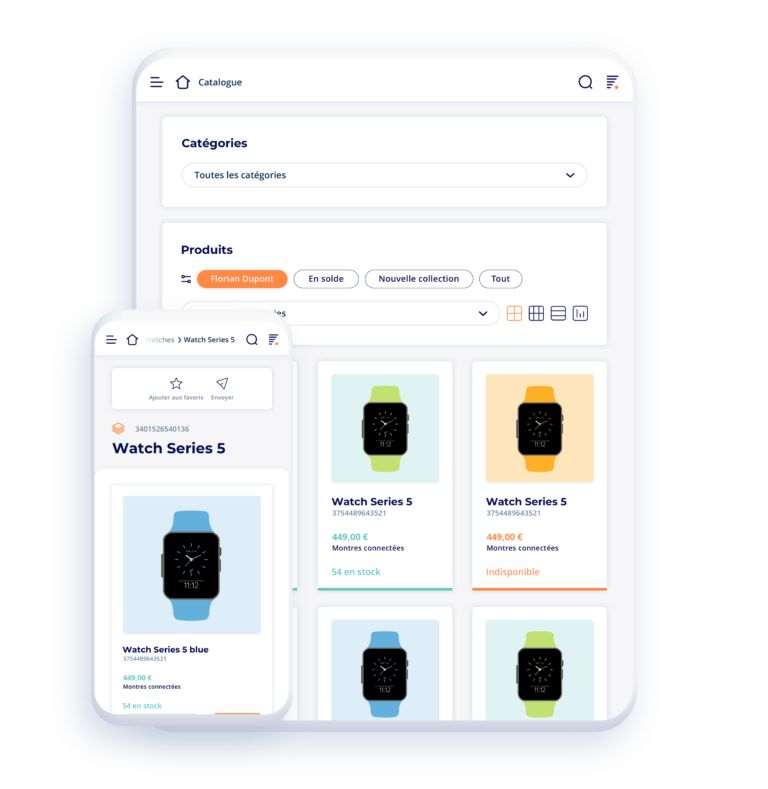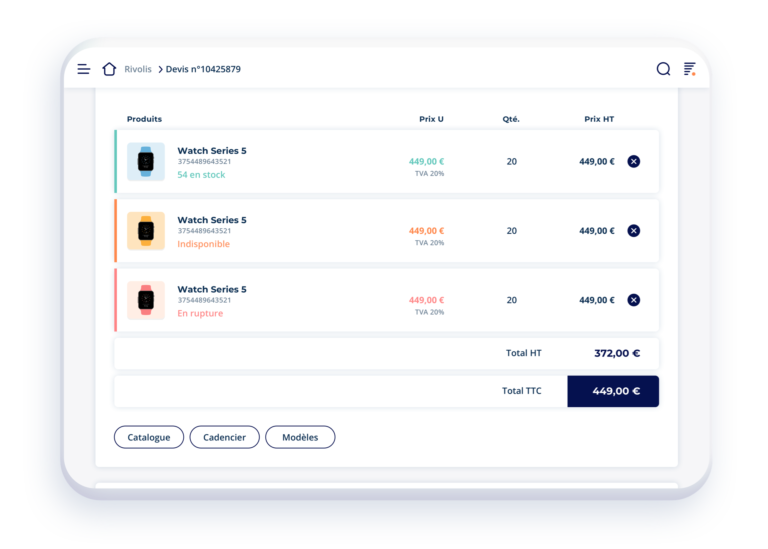What is CRM software? Definition and analysis
CRM software is an essential tool for companies seeking to manage their relationships with customers, prospects and partners effectively.

What is CRM software?
“CRM” is an acronym for Customer Relationship Management, and refers to a type of software dedicated to customer relationship management.
In practical terms, CRM software records and centralises customer data such as e-mail addresses, telephone numbers, social network profiles and the interactions you have already had with that customer. It then provides an exhaustive record of individuals and companies to help you better understand your relationships over time.
What is a prospecting CRM application?
A prospecting CRM application is software designed to help salespeople manage and develop their prospect portfolio. Unlike more general CRM applications, those specifically focused on prospecting are optimised for tracking and converting prospects into customers. They offer specific functionalities for organising, tracking and managing interactions with prospects throughout the sales cycle.
History of prospecting tools
Prospecting tools, while modern in their current form, have their roots in companies’ early attempts to manage their customer contacts and interactions effectively. Over the decades, these tools have evolved to meet companies’ growing needs in terms of commercial prospecting.
The beginnings in the 80s
The arrival of the internet in the 90s
In the 1990s, with the rise of the Internet, customer relationship management (CRM) software began to emerge. These early CRMs were often complex and expensive solutions, aimed primarily at large companies.
The advent of the Cloud
With the advent of cloud computing and improved Internet connectivity, cloud-based CRMs began to gain in popularity. These solutions offered increased accessibility, allowing businesses to manage their customer interactions from anywhere, at any time.
Over the past two decades, prospecting software has continued to evolve, incorporating more and more automation, artificial intelligence and predictive analytics to help salespeople target prospects effectively and maximise their chances of conversion.
Today, prospecting software is an integral part of the sales strategy of many companies, whatever their size or industry. It is a key element in reaching and engaging prospects in an increasingly competitive and constantly changing commercial environment.
Who is prospecting software for?
Today, this mobile solution is easily adaptable to the needs of all businesses.
Whether you are an SME or a large organisation, using a CRM has significant benefits:
- For SMEs, it represents an essential pillar in personalising services, improving customer loyalty and also in strategic decision-making.
- Large companies also benefit, particularly when it comes to coordinating teams and implementing advanced customer segmentation.
What are the key features of a prospecting CRM?
Product Catalogue
In the collective mind, when we think of a sales rep on tour, we all think of him in the same way: a sales rep travelling the roads with his trunk full of boxes and catalogues as big as encyclopaedias tucked under his arm. Today, thanks to the cloud, those days are gone.
In their CRM application, sales staff can take on board the whole of the company’s catalogue, subdivided if necessary into specific catalogues with products and pricing conditions tailored to each customer.

Creating quotes and orders
In our CRM application, you can create a quote in less than 2 minutes, and turn it into an order even faster. And synchronisation with your IS means that this information can be fed back into your IS in real time and orders generated, with the direct result of shortening delivery times.

Sales pipeline management
CRM enables you to create and manage customised sales pipelines, in other words, structured processes for managing the various stages of the sales cycle. A pipeline is made up of predefined stages for tracking the progress of prospects through the sales process.
Sales teams can easily visualise where prospects are in the pipeline and identify potential obstacles and high-potential opportunities.
Sales forecasting
Customer service
With access to customer preferences and behaviour, it’s easier for them to adapt their approach. This plays a major role in boosting customer satisfaction and loyalty.
Analysis and reporting
The analysis and reporting functions of CRM software enable company management to obtain valuable information about their sales performance, sales trends and customer behaviour.
Benefits
- Optimised management of prospects and leads: By centralising all information on prospects, a prospecting CRM application enables sales reps to better organise their prospecting activities.
Improved sales productivity : Thanks to features such as task automation and reminder management, sales staff can devote more time to high-value-added activities. - Increased collaboration within the sales team: By sharing prospect information and collaborating on prospecting strategies, sales teams can work more efficiently and consistently.
- Personalise interactions with prospects: A prospecting CRM application enables sales reps to personalise their communications with prospects according to their specific needs and preferences.
- Effective monitoring of prospecting performance and results: Using dashboards and analytical reports, sales reps can monitor and evaluate their prospecting performance, identifying what’s working best and what can be improved.
How do you choose the right CRM software for your business?
The choice of CRM software is a major strategic decision for your business; it must meet your company’s specific needs in order to improve the efficiency of your operations. To do this, it needs to be adaptable and customisable to align with your business processes and enable you to derive maximum benefit from it.
Here are a few criteria to consider when choosing your CRM software:
Ease of use:
CRM software should be user-friendly and intuitive for end-users, especially as it is generally used by different departments within the same company. A clear user interface and easy navigation will enable your teams to adopt it quickly and use it effectively.
Integration with other systems:
Make sure that CRM software can easily integrate with other systems and applications that your business already uses, such as marketing tools, e-commerce platforms, financial management solutions, etc.
This will ensure significant time savings and greater efficiency for your staff.
Scalability:
Choose CRM software that can grow with your business. It must be able to handle an increase in data volume, additional users and advanced functionalities as your business grows.
Data security:
Data security is paramount. Make sure the CRM software offers robust cyber security features, such as data encryption, access management and regular backups, to protect your customers’ sensitive information.
Customer support and training:
Look for a CRM provider that offers responsive customer support and comprehensive training resources. Reliable technical support and guidance through the implementation and use of the software are essential to ensure successful user adoption.
Total cost of ownership (TCO):
Carefully assess the costs associated with software purchase, implementation, customisation, maintenance and training. Make sure that the TCO is in line with your budget and that you get a good return on investment (ROI).
In short, CRM software is a decisive tool for businesses because it facilitates collaboration between different teams, brings useful information to light and helps to manage sales.
It’s much more than just a contact management tool, it’s the one that enables you to turn your customer relationships into successful opportunities!
